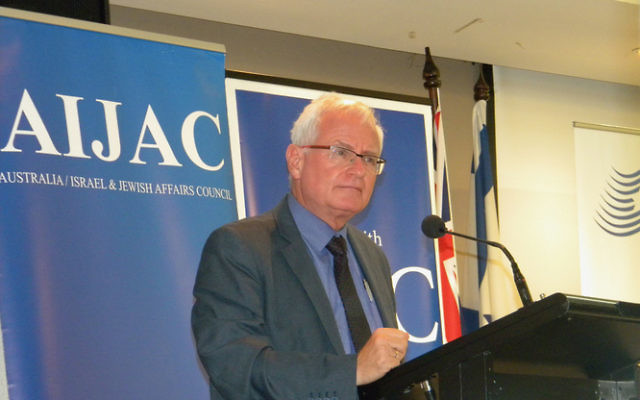Israel’s rising global status
"THOSE who urge boycotts of Israel or unilateral recognition of a Palestinian state claim that they are on the right side of history, but they are very wrong." That was the emphatic message given to a 200-strong crowd by leading Israeli strategic analyst Dr Eran Lerman during his recent trip to Australia, as a guest of the Australia/Israel & Jewish Affairs Council (AIJAC).
“THOSE who urge boycotts of Israel or unilateral recognition of a Palestinian state claim that they are on the right side of history, but they are very wrong.” That was the emphatic message given to a 200-strong crowd by leading Israeli strategic analyst Dr Eran Lerman during his recent trip to Australia, as a guest of the Australia/Israel & Jewish Affairs Council (AIJAC).
Speaking at an event co-sponsored by AIJAC, the Anti-Defamation Commission and Zionism Victoria, Lerman, a former deputy national security adviser in the Prime Minister’s Office and now a senior associate at the Begin Sadat Centre for Strategic Studies, noted Israel’s improving relations with a number of important countries. For example, he cited the new “geopolitical building block” between Israel, Greece and Cyprus based on their shared Mediterranean gas fields, and also strategic considerations. This, he said, was remarkable, given that 25 years ago “Greece was practically the 23rd country of the Arab League”. Yet now, he said, under “Alexis Tsipras – the most left-wing European politician in power”, they have a genuine alliance.
Lerman also noted that Indian Prime Minister Narendra Modi had a very successful and harmonious trip to Israel without feeling the need to also visit the Palestinians. After that, Lerman said, PM Benjamin Netanyahu went to France, where President Emmanuel Macron “gave a powerful speech castigating anti-Zionism as a form of anti-Semitism”, a development he described as “remarkable”, contrasting with previous UN resolutions that had labelled Zionism as racist.
Lerman further observed that Netanyahu had been invited to be the fifth participant in the Visegrad group, also known as the V4, comprising Poland, the Czech Republic, Slovakia and Hungary.
In addition, he pointed to the emerging confluence of strategic interests between Israel and the Arab Gulf states, to the extent that, when the Palestinians were rioting over security cameras on the Temple Mount, the Saudis gave them no support. This is because Israel and the Gulf States are on the same page strategically in viewing Iran and its proxies as the main enemy.
Lerman then moved on to his current campaign to have the accepted description of Israel as being in the Middle East replaced with the Eastern Mediterranean. He explained that this is far more appropriate, as it is more reflective of Israel’s place in the world alongside other non-Arab countries.
Other reasons he cited for Israel’s improving international standing were the need for Israeli expertise in fighting terror, in cyberdefence, in missile defence and in technology generally.
During his visit, Lerman also spoke at Central Synagogue in Sydney and the Sydney Institute.
AJN STAFF


comments